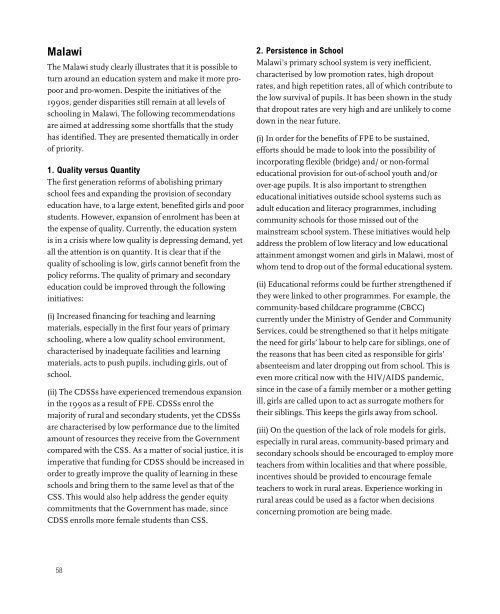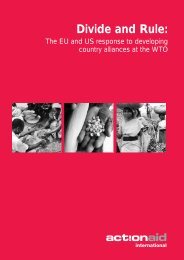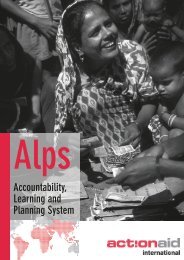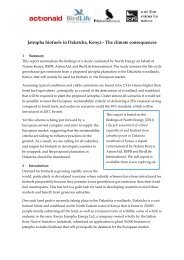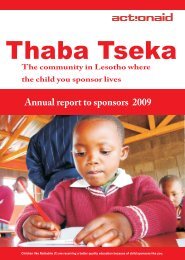A fair chance - United Nations Girls' Education Initiative
A fair chance - United Nations Girls' Education Initiative
A fair chance - United Nations Girls' Education Initiative
Create successful ePaper yourself
Turn your PDF publications into a flip-book with our unique Google optimized e-Paper software.
MalawiThe Malawi study clearly illustrates that it is possible toturn around an education system and make it more propoorand pro-women. Despite the initiatives of the1990s, gender disparities still remain at all levels ofschooling in Malawi. The following recommendationsare aimed at addressing some shortfalls that the studyhas identified. They are presented thematically in orderof priority.1. Quality versus QuantityThe first generation reforms of abolishing primaryschool fees and expanding the provision of secondaryeducation have, to a large extent, benefited girls and poorstudents. However, expansion of enrolment has been atthe expense of quality. Currently, the education systemis in a crisis where low quality is depressing demand, yetall the attention is on quantity. It is clear that if thequality of schooling is low, girls cannot benefit from thepolicy reforms. The quality of primary and secondaryeducation could be improved through the followinginitiatives:(i) Increased financing for teaching and learningmaterials, especially in the first four years of primaryschooling, where a low quality school environment,characterised by inadequate facilities and learningmaterials, acts to push pupils, including girls, out ofschool.(ii) The CDSSs have experienced tremendous expansionin the 1990s as a result of FPE. CDSSs enrol themajority of rural and secondary students, yet the CDSSsare characterised by low performance due to the limitedamount of resources they receive from the Governmentcompared with the CSS. As a matter of social justice, it isimperative that funding for CDSS should be increased inorder to greatly improve the quality of learning in theseschools and bring them to the same level as that of theCSS. This would also help address the gender equitycommitments that the Government has made, sinceCDSS enrolls more female students than CSS.2. Persistence in SchoolMalawi’s primary school system is very inefficient,characterised by low promotion rates, high dropoutrates, and high repetition rates, all of which contribute tothe low survival of pupils. It has been shown in the studythat dropout rates are very high and are unlikely to comedown in the near future.(i) In order for the benefits of FPE to be sustained,efforts should be made to look into the possibility ofincorporating flexible (bridge) and/ or non-formaleducational provision for out-of-school youth and/orover-age pupils. It is also important to strengtheneducational initiatives outside school systems such asadult education and literacy programmes, includingcommunity schools for those missed out of themainstream school system. These initiatives would helpaddress the problem of low literacy and low educationalattainment amongst women and girls in Malawi, most ofwhom tend to drop out of the formal educational system.(ii) <strong>Education</strong>al reforms could be further strengthened ifthey were linked to other programmes. For example, thecommunity-based childcare programme (CBCC)currently under the Ministry of Gender and CommunityServices, could be strengthened so that it helps mitigatethe need for girls’ labour to help care for siblings, one ofthe reasons that has been cited as responsible for girls’absenteeism and later dropping out from school. This iseven more critical now with the HIV/AIDS pandemic,since in the case of a family member or a mother gettingill, girls are called upon to act as surrogate mothers fortheir siblings. This keeps the girls away from school.(iii) On the question of the lack of role models for girls,especially in rural areas, community-based primary andsecondary schools should be encouraged to employ moreteachers from within localities and that where possible,incentives should be provided to encourage femaleteachers to work in rural areas. Experience working inrural areas could be used as a factor when decisionsconcerning promotion are being made.58


